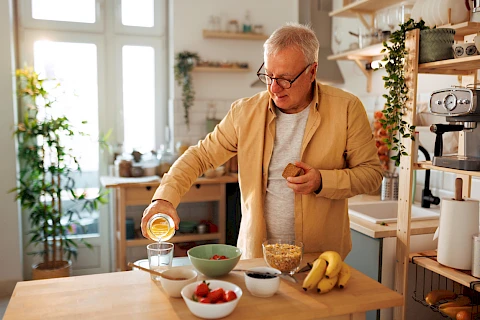
Parkinson's disease presents unique challenges for seniors and their families. From managing symptoms to adjusting lifestyle, each one requires careful consideration. At the heart of this is Parkinson's diet and nutrition. A balanced, nutrient-rich diet can significantly alleviate symptoms, enhance overall health, and improve the quality of life for those living with Parkinson's.
Today, we'll learn about the importance of diet and nutrition for seniors with Parkinson's disease, explore foods that can potentially alleviate symptoms, and offer practical dietary tips tailored to their unique needs… all without sacrificing taste and satisfaction.
Parkinson's Disease: The Basics
Parkinson's disease is a neurodegenerative disorder that predominantly affects dopamine-producing neurons in a specific area of the brain. The symptoms generally develop slowly over several years and can include tremors, rigidity, slowness of movement, and postural instability.
Diet and Nutrition in Parkinson's Care
Whatever the stage of Parkinson's disease, nutrition plays a vital role. A well-balanced diet can help manage symptoms, improve immune function, reduce inflammation, and promote overall health. On top of this, diet and nutrition can alleviate certain symptoms. For instance, increasing fiber intake and fluid can help manage constipation, a common issue in Parkinson's.
Foods Beneficial for Seniors Living With Parkinson's
Research indicates that certain foods may benefit those with Parkinson's. Antioxidant-rich foods, like berries, tomatoes, and bell peppers, fight against oxidative stress, a key contributor to this disease. Fiber-rich foods such as legumes, whole grains, and fruits can help manage constipation. Maintaining hydration prevents low blood pressure, another common symptom. Omega-3 fatty acids, found in fish and flax seeds, have been linked to improved mood and cognition, which can help manage the mental and emotional distress often associated with Parkinson's disease.
Practical Dietary Tips for Those Living With Parkinson's
Managing a good diet for those living with Parkinson's requires extra planning. For example, eating five to six smaller meals instead of three larger ones can help manage medications' timing and effectiveness. It's also important to set aside plenty of time for meals to avoid rushing, which can be challenging for those who eat more slowly. It's often helpful to plan and prepare meals and snacks in advance to ensure proper nutrition and eliminate unhealthy snacking.
How Senior Helpers Vero Beach Can Help
Managing Parkinson's disease requires a comprehensive approach, focusing on diet and nutrition. The right foods and dietary practices can alleviate symptoms, improve quality of life, and provide the necessary energy and nutrients.
At Senior Helpers Vero Beach, we offer expert Parkinson's care services, including assistance with meal planning and preparation. Our dedicated caregivers understand the unique dietary needs of seniors living with Parkinson's and can ensure that each meal is nutrient-dense and meets the specific needs of the individual. We truly believe that proper nutrition is a key component in managing Parkinson's symptoms, and our services are designed to help our clients maintain a healthy diet while living a comfortable life at home.
If you or a senior loved one living in the Fellsmere, Sebastian, Vero Beach, Fort Pierce, and Okeechobee areas could benefit from our in-home senior care services, contact us today.